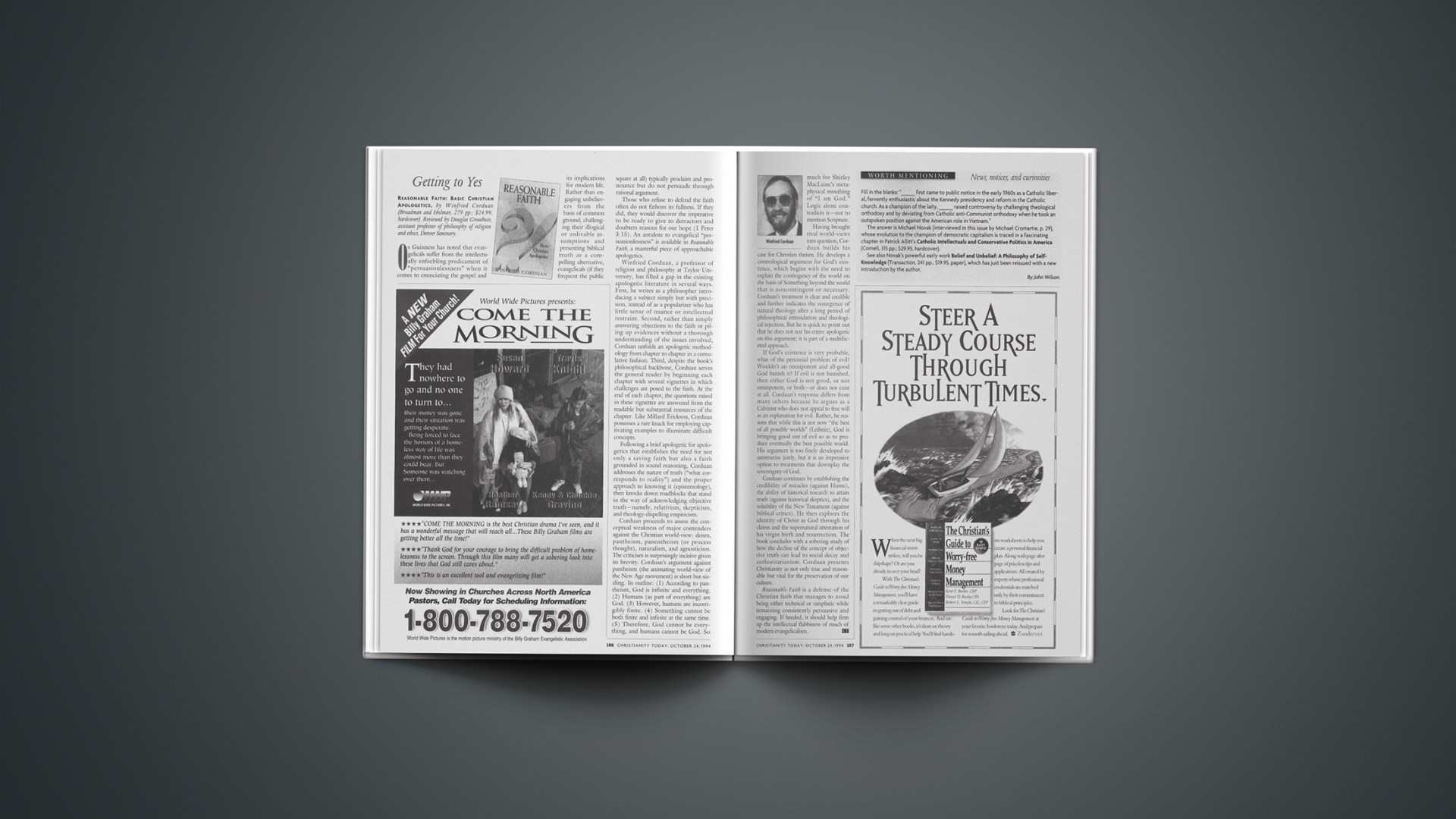“Reasonable Faith: Basic Christian Apologetics,” by Winfried Corduan (Broadman and Holman, 279 pp.; $24.99, hardcover). Reviewed by Douglas Groothuis, assistant professor of philosophy of religion and ethics, Denver Seminary.
Os Guinness has noted that evangelicals suffer from the intellectually enfeebling predicament of “persuasionlessness” when it comes to enunciating the gospel and its implications for modern life. Rather than engaging unbelievers from the basis of common ground, challenging their illogical or unlivable assumptions and presenting biblical truth as a compelling alternative, evangelicals (if they frequent the public square at all) typically proclaim and pronounce but do not persuade through rational argument.
Those who refuse to defend the faith often do not fathom its fullness. If they did, they would discover the imperative to be ready to give to detractors and doubters reasons for our hope (1 Peter 3:15). An antidote to evangelical “persuasionlessness” is available in “Reasonable Faith,” a masterful piece of approachable apologetics.
Winfried Corduan, a professor of religion and philosophy at Taylor University, has filled a gap in the existing apologetic literature in several ways. First, he writes as a philosopher introducing a subject simply but with precision, instead of as a popularizer who has little sense of nuance or intellectual restraint. Second, rather than simply answering objections to the faith or piling up evidences without a thorough understanding of the issues involved, Corduan unfolds an apologetic methodology from chapter to chapter in a cumulative fashion. Third, despite the book’s philosophical backbone, Corduan serves the general reader by beginning each chapter with several vignettes in which challenges are posed to the faith. At the end of each chapter, the questions raised in these vignettes are answered from the readable but substantial resources of the chapter. Like Millard Erickson, Corduan possesses a rare knack for employing captivating examples to illuminate difficult concepts.
Following a brief apologetic for apologetics that establishes the need for not only a saving faith but also a faith grounded in sound reasoning, Corduan addresses the nature of truth (“what corresponds to reality”) and the proper approach to knowing it (epistemology), then knocks down roadblocks that stand in the way of acknowledging objective truth-namely, relativism, skepticism, and theology-dispelling empiricism.
Corduan proceeds to assess the conceptual weakness of major contenders against the Christian world-view: deism, pantheism, panentheism (or process thought), naturalism, and agnosticism. The criticism is surprisingly incisive given its brevity. Corduan’s argument against pantheism (the animating world-view of the New Age movement) is short but sizzling. In outline: (1) According to pantheism, God is infinite and everything. (2) Humans (as part of everything) are God. (3) However, humans are incorrigibly finite. (4) Something cannot be both finite and infinite at the same time. (5) Therefore, God cannot be everything, and humans cannot be God. So much for Shirley MacLaine’s metaphysical mouthing of “I am God.” Logic alone contradicts it-not to mention Scripture.
Having brought rival world-views into question, Corduan builds his case for Christian theism. He develops a cosmological argument for God’s existence, which begins with the need to explain the contingency of the world on the basis of Something beyond the world that is noncontingent or necessary. Corduan’s treatment is clear and credible and further indicates the resurgence of natural theology after a long period of philosophical intimidation and theological rejection. But he is quick to point out that he does not rest his entire apologetic on this argument; it is part of a multifaceted approach.
If God’s existence is very probable, what of the perennial problem of evil? Wouldn’t an omnipotent and all-good God banish it? If evil is not banished, then either God is not good, or not omnipotent, or both-or does not exist at all. Corduan’s response differs from many others because he argues as a Calvinist who does not appeal to free will as an explanation for evil. Rather, he reasons that while this is not now “the best of all possible worlds” (Leibniz), God is bringing good out of evil so as to produce eventually the best possible world. His argument is too finely developed to summarize justly, but it is an impressive option to treatments that downplay the sovereignty of God.
Corduan continues by establishing the credibility of miracles (against Hume), the ability of historical research to attain truth (against historical skeptics), and the reliability of the New Testament (against biblical critics). He then explores the identity of Christ as God through his claims and the supernatural attestation of his virgin birth and resurrection. The book concludes with a sobering study of how the decline of the concept of objective truth can lead to social decay and authoritarianism. Corduan presents Christianity as not only true and reasonable but vital for the preservation of our culture.
“Reasonable Faith” is a defense of the Christian faith that manages to avoid being either technical or simplistic while remaining consistently persuasive and engaging. If heeded, it should help firm up the intellectual flabbiness of much of modern evangelicalism.
Copyright © 1994 Christianity Today. Click for reprint information.










